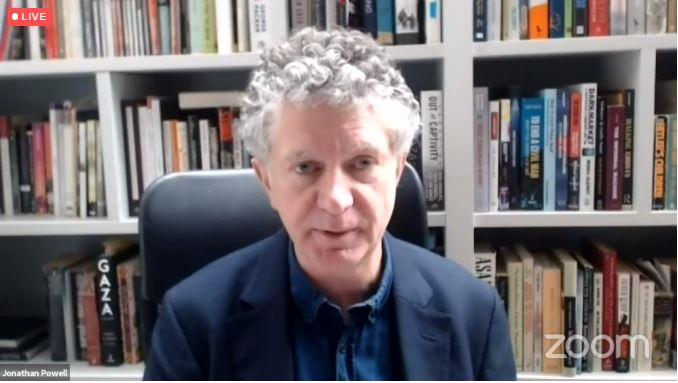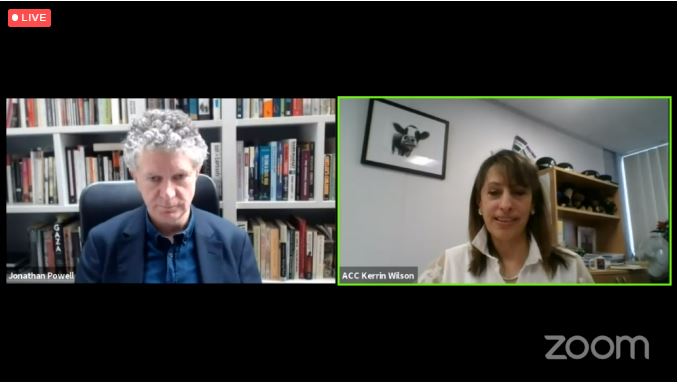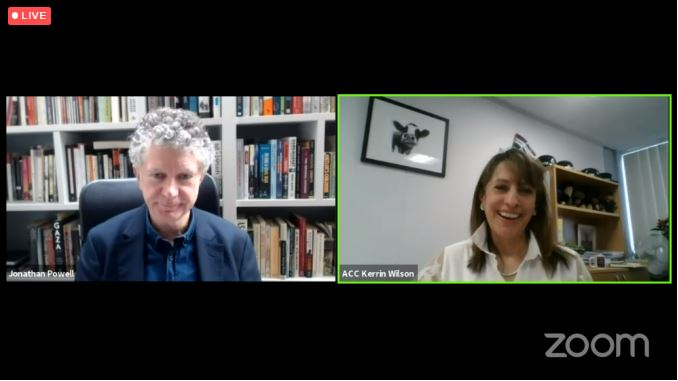On Wednesday 10 February, Cumberland Lodge hosted the second of three public webinars in the lead-up to the 2021 Cumberland Lodge Police Conference, Towards Justice: Law Enforcement & Reconciliation, taking place in June 2021.
This webinar, Insights into Truth and Reconciliation, took the form of a discussion between Assistant Chief Constable Kerrin Wilson QPM from Lincolnshire Constabulary and Jonathan Powell, Chief Executive of Inter Mediate and the UK’s former Chief British Negotiator on Northern Ireland.
The webinar focused on issues that were wrestled with in Northern Ireland during the period of conflict known as The Troubles, which refers to the conflict between the Protestant and Roman Catholic communities, over whether or not Northern Ireland should become part of the Republic of Ireland. Jonathan went on to compare recent responses to these past harms in Northern Ireland during the mid- to late-20th century to conflicts in South Africa, Afghanistan, Colombia, Libya and Indonesia.
Incremental progress
Jonathan explained how the Good Friday Agreement (Belfast Agreement), signed in 1998 ended most of the violence of The Troubles, after decades of negotiations and previous failed peace agreements. This highlighted one of the webinar’s recurring themes: that the path towards transitional justice is built on incremental progress rather than on sudden breakthroughs.
Jonathan also served as Prime Minister Tony Blair’s Chief of Staff from 1997 until 2007, and he and the Prime Minister saw it as their mission to free Northern Ireland from ‘the chains of history’ and a complex politics that prevented a line from being drawn under past atrocities.
The principle of ‘agree to disagree’, Jonathan went onto explain, has been integral to the success of the Agreement. I found this a timely reminder that, although differences can be managed by peace agreements, they do not necessarily disappear, and tensions can resurge if events occur that challenge the delicate balancing act needed to keep the peace.
We have seen evidence of this recently, where the prospect of a hard border within Ireland as a potential outcome of Brexit has threatened the provisions of the Good Friday Agreement and raised the spectre of civil violence.

Lessons from the Good Friday Agreement
Kerrin then asked Jonathan to reflect on how the Good Friday Agreement was brokered when past attempts to end the conflict had failed. Jonathan highlighted the ‘perceived mutually hurting stalemate’ that all sides were increasingly acknowledging, by the 1990s, as well as the political capabilities and convictions of the men and women sat around the negotiating table.
The length of time that Tony Blair and Bertie Ahern (Ireland’s Taoiseach from 1997 to 2008) spent concurrently in office, committed to keeping the process moving forwards, and their relative freedom from the political constraints that held back their predecessors, were also decisive factors in ultimately winning peace. A willingness to apologise, as Tony Blair did for the potato famine of 1845 to 1852, on his first visit to Ireland as Prime Minister, and to do so with sincerity, was also crucial to the journey towards reconciliation.
The fact that the police were seen as being one-sided was central to Northern Ireland’s problems, but the Good Friday Agreement did not resolve this specifically. Instead, it was agreed that an independent commission should be set up, under Chris Patten, to develop solutions (including recruiting more Catholics to the police) and to address the policing of controversial marches that continue today.
For me, this emphasised the need to monitor potential fault lines in peace agreements carefully, and for all sides to remain committed to implementing the agreed measures, long after public attention has moved onto another issue, in order to maintain peace.
Peace processes around the world
Jonathan then spoke about his work in Colombia. The Colombian peace process that led to the Revolutionary Armed Forces of Colombia (FARC) and the Colombian government of President Juan Manuel Santos entering into a peace agreement in 2016 brought an end to a conflict that had persisted since the 1950s.
Jonathan shared his experiences of working on the process, observing that it had been a ‘thorny issue’ due to controversies around the model of transitional justice used there, but that it had also been a means of catharsis, as he witnessed amongst mothers of FARC victims during the signing of the final peace agreement.
He conceded, however, that in some situations, truth and reconciliation processes can prove to be just too painful to proceed with, as was the case in Aceh, Indonesia, where a truth and reconciliation commission to consider violence linked to the civil war there was legislated for but never came into being.

‘A light at the end of the tunnel’
In his closing remarks, Jonathan shared an important reflection from the review of official files relating to the Good Friday Agreement that he conducted when he left Government service in 2007: the need for peace negotiators to think about the implementation of peace agreements while conducting negotiations, and to pursue a process-driven approach to ensure forward momentum.
This approach is important for avoiding a situation in which an end-point to conflict is identified, but without a clear way to reach it – described by the late President of Israel Shimon Perez as ‘a light at the end of the tunnel, but no tunnel to get there’.
I came away from the webinar convinced of the importance of learning lessons from previous conflicts – looking at what has and hasn’t worked in diverse international settings – to avoid being trapped by the mistakes of the past.
In the case of Northern Ireland, entrenched positions shifted, and peace was won after various enabling factors came together. Politicians, activists, and negotiators who are skilled enough to recognise moments of opportunity like this, as they come about, will continue to play a central role in securing peace around the world in years to come.


